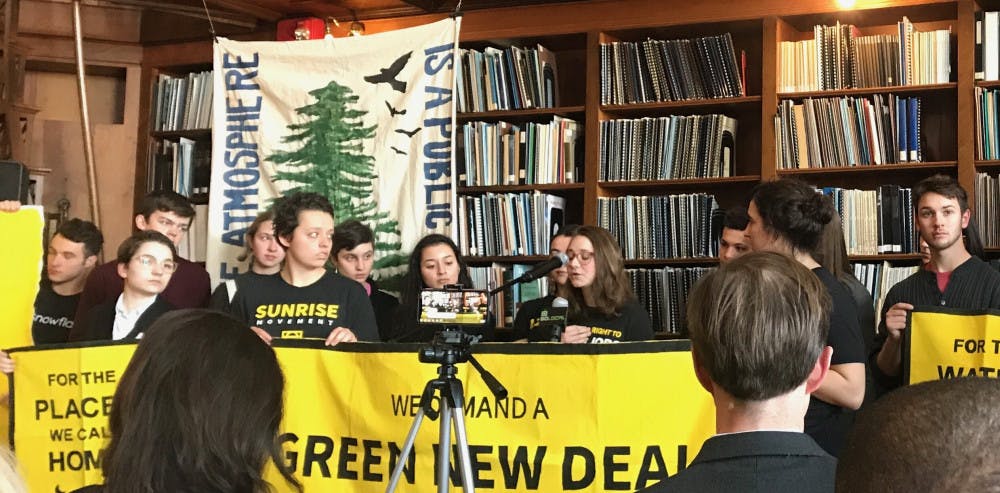Promises of a Green New Deal at the national level trickled down to the Ocean State Thursday, when politicians and community activists alike gathered in the Rhode Island State House to announce plans to research the possibilities for a state Green New Deal.
House Resolution 5665, introduced Thursday and sponsored by Rep. Chris Blazejewski, D-Providence, would support research on economic, social and environmental factors to inform a state-wide legislative agenda to address climate change, modeled off of the national proposal of a Green New Deal. A matching Senate resolution will be introduced shortly, said Sen. Louis DiPalma ScM’89 P’08, D-Little Compton, Middletown, Newport and Tiverton, a sponsor for the Senate resolution. If passed, the Council must provide the information found through its study to the legislature by May 15, said Michael Roles, project manager of Rhode Island Green New Deal Research Council.
The Council, funded by the University’s Climate and Development Lab, plans to conduct the research regardless of whether or not the resolution passes, DiPalma said. The resolution would signal that the legislature understands and appreciates the study and “wants to see the results,” he added.
Through studying existing data and employing activists on the ground to gather information relating to how people “interact with various parts of the economy,” the Council hopes to provide information on what Rhode Islanders might need from a Green New Deal to simultaneously address economic, equity and climate concerns in the state. “We’re taking a look at how Green New Deal related ideas would fit within Rhode Island’s economic and social sectors,” Roles said. “The resolution is not an endorsement of the Green New Deal,” but rather connects the Council’s work of figuring out what a Green New Deal could look like in Rhode Island to decision makers at the state level, he added.
The Council is working in tandem with Sunrise Rhode Island, which has been “mobilizing the people power” to move this kind of resolution forward, said Lauren Maunus ‘19, a leader of the Sunrise RI Movement. While the Research Council will focus on data and possible policy formulation, Sunrise will handle much of the community engagement and activism — “making the important noise that needs to happen,” Roles said.
Members of Sunrise RI traveled to Washington, D.C. last month to bring attention to national climate change policy and protest Senate Majority Leader Mitch McConnell’s acceptance of fossil fuel money, The Herald previously reported.
While there are efforts, spearheaded by Rep. Alexandria Ocasio-Cortez D-NY and Sen. Ed Markey, D-MA, to enact large-scale legislation to address climate change at the national level, some experts believe state-level action is a more realistic first step. “Right now, given the resistance in Washington to the Green New Deal,” the state of Rhode Island must “work on what we can do here,” said Ken Payne, policy expert and former head of the Office of Energy Resources. “States are the laboratories of democracy,” he added, and “there’s nothing that precludes Rhode Island from ramping up our commitment to renewable energy.”
Roles identified two primary vulnerabilities in Rhode Island that he believes a new state-level climate plan could address: rising sea levels as the “Ocean State” and recessions. Rhode Island tends to be the “first to fall into a recession, and the last to climb out of them,” Roles added. While hurricanes and recessions are “inevitable,” a Rhode Island Green New Deal could ensure that the state’s “bottom doesn’t fall out” when they occur by strengthening the economy, Roles said.
The state has taken steps to address climate change, so Payne sees the new legislation as “not necessarily new terrain. It’s familiar terrain that needs to be bolstered, amplified, taken to the next level.”
Maunus hopes the research will result in policy in 2020.





